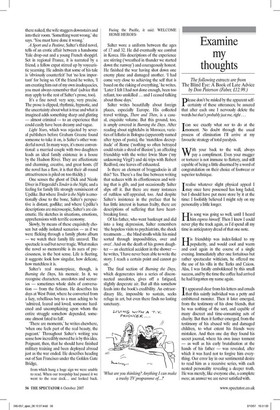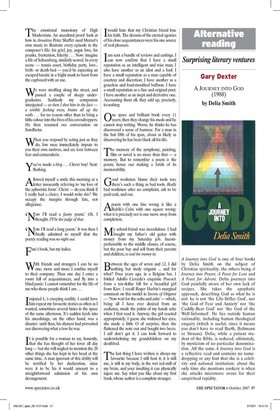Examine my thoughts
The following extracts are from The Blind Eye: A Book of Late Advice by Don Paterson (Faber, £12.99.) please don't be misled by the apparent self1 certainty of these utterances; be assured that after each one I nervously delete the words but that's probably just me, right . . .
Ican see exactly what not to do at the moment. No doubt through the usual process of elimination I'll arrive at my favourite strategy of total paralysis.
with your back to the wall, always pay a compliment. Even your mugger or torturer is not immune to flattery, and still capable of being a little disarmed by a word of congratulation on their choice of footwear or superior technique.
Irealise whatever slight physical appeal I may once have possessed has long faded, but I should have put more store by it at the time: I foolishly believed I might rely on my personality a little longer.
His song was going so well, until I heard him express himself Then I knew I could never play the track again, as I'd spend all my time in anticipatory dread of that one note.
His friendship was index-linked to my popularity, and would cool and warm and cool again in the course of a single evening. Immediately after one fortuitous but rather spectacular witticism, he offered me the use of his villa in the Turks and Caicos. Alas, I was fatally emboldened by this small success, and by the time the coffee had arrived he had forgotten my name again.
It appeared clear from his letters and emails that this saintly individual was a petty and embittered monster. Then it later emerged, from the testimony of his close friends, that he was nothing of the sort, and capable of many discreet and time-consuming acts of charity. But then it further emerged, from the testimony of his abused wife and damaged children, to what extent his friends were mistaken. And then one day they found his secret journal, where his own inner torment — as well as his early brutalisation at the hands of his father — was revealed, after which it was hard not to forgive him everything. Our error lay in our sentimental desire to read him as a recursive series, with each nested personality revealing a deeper truth. He was merely, like everyone else, a complete mess; an answer we are never satisfied with.
The emotional monotony of High Modernism. An anecdotal proof: look at how in Amadeus Peter Shaffer used Mozart's own music to illustrate every episode in the composer's life: his grief, joy, angst, love, his pranks, frustration, hilarity. .. Now: imagine a life of Schoenberg, similarly scored. In every scene — tennis court, birthday party, love-, birthor death-bed — you'd be expecting an escaped lunatic in a fright mask to burst from the cupboard with an axe.
We were strolling along the street, and passed a couple of sleepy undergraduates. Suddenly my companion interjected —so then I shot him in the face — a terrible fucking mess, brains all up the walls. . . for no reason other than to bring a little colour into the lives of his eavesdroppers. He then resumed our conversation on Sondheim.
When you respond by acting just as they do, low men immediately impute to you their own motives, and are torn between fear and camaraderie.
you've made a blog . . . Clever boy! Next: flushing.
Allowed myself a smile this morning at a etter innocently referring to 'my love of the aphoristic form'. Christ — do you think if I really had a choice, I would write this? We occupy the margins through fate, not allegiance.
G 'Mow I'll read a funny poem.' Oh, I 1 thought. I'll be the judge of that.
G Mow I'll read a long poem.' It was then I 1 finally admitted to myself that the poetry reading was no night out.
rate's book, but my italics.
With friends and strangers I can be no one; more and more I confine myself to their company. Then one day I enter a room full of acquaintances, and fly into a blind panic: I cannot remember for the life of me who these people think I am ...
Ienjoyed L.'s creeping senility. I could have him repeat my favourite stories as often as I wanted, sometimes several times in the space of the same afternoon. X's sudden lurch into his anecdotage, on the other hand, was a disaster: until then, his shyness had prevented our discovering what a bore he was.
It is possible for a woman to say, honestly, that she has thought of her lover all day long — but she will neglect to mention the 20 other things she has kept in her head at the same time. A man ignorant of this ability will be terrified by her declaration, since were it to be his it would amount to a straightforward admission of his own derangement.
Iwould hate that my Christian friend lose his faith. The dreams of the eternal agonies of his close acquaintances were his one source of real pleasure.
Iam sent a bundle of reviews and cuttings. I can now confirm that I have a small reputation as an intelligent and wise man; I also have another as an idiot and a fool. I have a small reputation as a man capable of courtesy and discretion; I have another as a graceless and loud-mouthed buffoon. I have a small reputation as a fine and original poet; I have another as an inept and derivative one. Accounting them all, they add up, precisely, to nothing.
Onespare and brilliant book every 11 years; then they change his meds and he cannot stop writing. Worse, he thinks he has discovered a sense of humour. For a man in the last fifth of his span, about as likely as discovering he has been black all his life.
The memory of the symphony, painting, film or novel is no more than that — a memory. But to remember a poem is the poem; hence our making a fetish of its memorability.
Good workmen blame their tools too; there's such a thing as bad tools. Really bad workmen utter no complaint, ask to be paid cash, and run.
poem with one line wrong is like a ubik's Cube with one square wrong: what it is precisely not is one move away from completion.
My school-friend was incredulous: I had bought my father's old guitar with money from my Saturday job. Incomprehensible to the middle classes, of course, but the poor buy and sell from their parents and children, to seal the money in.
Between the ages of seven and 12, I did nothing but study origami ... and for what? Four years ago, in a Belgian bar, I folded Adolfo Cerceda's exquisite Peacock from a ten-dollar bill for a beautiful girl from Kiev. I recall Roger Harbin's marginal comment on this model in Secrets of Origami — 'Now wait for the oohs and aahs' —which, being all I have ever desired from an audience, made the palms of my hands ache when I first read it. Anyway, the girl reacted appropriately, I guess; she widened her eyes, she made a little of surprise; then she flattened the note out and bought two beers. I still don't get it. I can look forward to underwhelming my grandchildren on my deathbed.
The last thing I have written is always my favourite because I still host it; it is still me, is still in my body, in the wet red mill of my brain, and your insulting it can physically injure me. Say what you like about my first book, whose author is a complete stranger.






























































 Previous page
Previous page